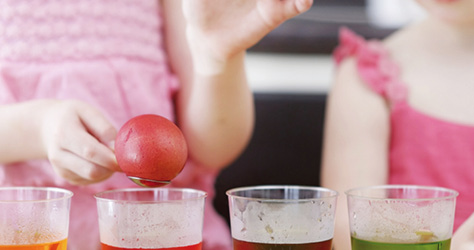Our guide to food allergies
More and more kids are suffering from food allergies. Find out about the most common ones, and get tips on how to deal with them.
At a glance
- Commonality of allergies
- Common foods which cause these allergies
- Allergic reactions and symptoms
- Top tips for dealing with allergies

Up to one in 12 children are allergic to certain foods
The figure has been rising for the past 40 years, although no one quite knows why. The most common foods to cause an allergy are: peanuts, milk, eggs, fish and tree nuts like hazelnuts and walnuts. Wheat, soy, sesame and kiwi fruits are also common problem foods.
An allergy happens when your little one‘s immune system gets confused. Instead of ignoring the proteins contained in certain foods, it triggers a reaction and the body starts producing a chemical called histamine. It’s the histamine that produces typical allergy symptoms such as itchy, swollen mouth/tongue/lips/throat, itchy and watery eyes, wheezy breathing, and skin problems like wheals, hives, raised itchy areas and rashes. Other symptoms may include vomiting, constipation and diarrhoea.
If your child is going to have a serious allergy, it’s likely to start by the age of one or two. Allergies to eggs and milk may disappear as your little one grows up. But nut and fish allergies tend to stay.
If you have a history of allergies in your family, your little one is more likely to have a food allergy. They are also more likely to have other allergic problems like asthma and hay fever. And babies with eczema (especially if it started before three months and is severe) are particularly likely to suffer from food allergies. Different allergies cause different symptoms, but a severe reaction is very rare among the under fives. However, if they are struggling to breathe, call an ambulance immediately.
If you suspect your little one has a food allergy - especially if their symptoms come on very soon after eating a particular food, make an appointment to see your GP. They may refer you to an allergy clinic for testing. Tests can vary depending on the allergy type. Therefore, if symptoms develop quickly (an IgE-medicated food allergy) the specialist will probably give a skin-prick test or blood test.
If symptoms develop more slowly (ie. a non-IgE medicated food allergy) you'll probably be put on a food elimination diet.
If your little one has a severe allergy and is at risk of anaphylaxis (a life-threatening sudden allergic reaction), you may be given an Adrenaline Auto-injector Pen (EpiPen is one brand name) which will inject adrenaline into their system quickly to tackle the allergy.
Food intolerances are more common than food allergies. They also produce symptoms such as tummy ache and bowel problems, but the symptoms are not instant. It can be difficult to work out what is causing them and the process may take some time, but make an appointment to see your GP if you suspect a problem.
Tips for parents
-
Keep a box of treat foods at home that are safe for your little one so they won’t miss out when everyone else is having fun food. For parties, make sure they have alternative safe foods
-
Always have some spare food in the car in case you’re out longer than you thought
-
Keep a list of safe and unsafe foods in the house and make sure childminders/nursery and pre-school know about your child’s allergy
-
Adapt recipes to cut out problem foods. See the Allergy UK charity website for details of useful cookbooks
-
Life will be easier if you can cook/bake multiple meals/food at once and freeze extra portions, carefully labelled
-
Get your little one used to the idea of not sharing food with their friends. Encourage them to tell you when they have been given a food they shouldn't eat. Promise them they won’t get into trouble for telling you
-
Teach them to resist any pressure from their friends to try new foods they’re unsure about.
For more information on coping with children’s allergies, see Allergy UK